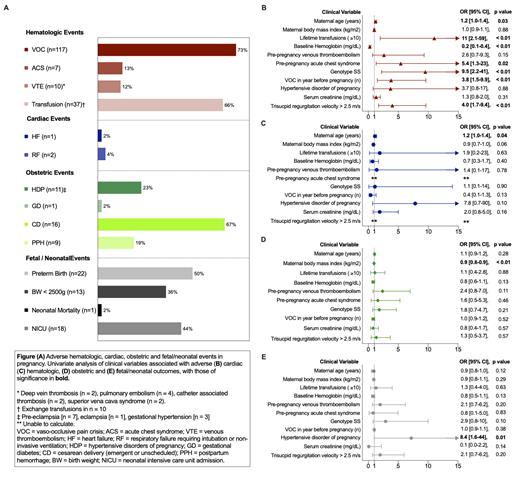Abstract
Background
Approximately 100,000 Americans are affected by sickle cell disease (SCD), an inherited hematologic disorder. In women with sickle cell disease, pregnancy is associated with increased maternal and fetal adverse outcomes (Elenga et al). However, there is a paucity of data on risk factors for adverse events in this population. This retrospective study seeks to add to the deficient repertoire of information regarding maternal and fetal outcomes in patients with sickle cell disease and their children.
Methods
We retrospectively evaluated pregnancy outcomes of women with SCD who had previously undergone echocardiography from the year 2000-2021. The associations between clinical variables and adverse hematologic (AHE), cardiac (ACE), obstetric (AOE) and fetal/neonatal (ANE) events were evaluated by the Generalized Linear Model (GLM). The adverse hematologic events were vaso-occlusive crisis (VOC) antepartum and postpartum, acute chest syndrome, venous thromboembolism antepartum and postpartum, and transfusion antepartum.
Results
We identified 43 women/59 pregnancies with a median maternal age 27 years old (interquartile range [IQR] 20), pre-pregnancy BMI 25 kg/m2 (IQR 16). Maternal sickle cell genotype was SS in 31 (72%) women/37 (63%) pregnancies, SC in 8 (18%) women/18 (31%) pregnancies, and other genotype in 4 (9%) women/4 (7%) pregnancies. Prior venous thromboembolism was present in 12 (27%) women/15 (25%) pregnancies and prior acute chest syndrome (ACS) in 33 (80%) women/41 (75%) pregnancies. In the year before pregnancy, 24 (56%) women were admitted at least once for VOC. There were no maternal deaths during pregnancy or up to 1 year postpartum. AHE (n = 171) occurred in 43 (73%) pregnancies (Figure A), with a median of 2 (range 0-13) AHE per pregnancy. AHE were more common with genotype SS, history of ACS, history of ³ 10 lifetime transfusions, admission for VOC in the year before pregnancy, tricuspid regurgitation velocity (TRV) >2.5 m/s on echocardiogram, and increased maternal age, and less common with increased hemoglobin (Figure B). ACE were rare (n = 3) (Figure A) and weakly associated with increased maternal age (Figure C). AOE (n = 37) occurred in 27 (45%) pregnancies (Figure A) and were associated with lower pre-pregnancy maternal BMI (Figure D). ANE (n = 54) occurred in 27 (46%) of pregnancies, and were associated with maternal hypertensive disorders of pregnancy (Figure E).
Conclusions
We found that AHE during pregnancy in women with SCD were associated with genotype SS, history of ACS, ³ 10 lifetime transfusions, admission for VOC in the year before pregnancy, higher maternal age, and inversely related to hemoglobin. In addition, AHE during pregnancy were associated with TRV >2.5 m/s on echocardiogram, which has not been previously shown in women with SCD. These data may be useful to identify women at increased risk during pregnancy. Data show that patients with sickle cell disease who have more disease-related complications including history of acute chest syndrome, frequent pain crisis, elevated TRV on echocardiogram, and lower hemoglobin are at greater risk for AHE. This suggests that disease severity is directly related to outcomes. The association between increased maternal age and ACE has been demonstrated in the past in women without SCD (DeViti et al). The same can be noted for the association of AOE with lower maternal BMI (Verma et al), and ANE being associated with maternal hypertensive disorders of pregnancy (Lugobe et al). In the future, prevention of these complications will be key. Future directions include determining the effect of disease-modifying therapy on these outcomes, though safety during pregnancy has not yet been demonstrated for more novel agents such as voxelotor and crizanlizumab. With more information on these risk factors, we hope that modification and treatment can result in better outcomes.
Desai: Pfizer: Other: Publication Fee, Research Funding; Foundation for Sickle Cell Research: Honoraria; Forma: Consultancy; Novartis: Research Funding, Speakers Bureau; Global Blood Therapeutics: Honoraria, Research Funding.


This feature is available to Subscribers Only
Sign In or Create an Account Close Modal